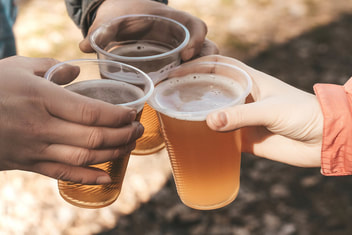So what's the big deal?
The CDC reports that most high school students have engaged in some sort of substance use before graduation, whether it be in the form of alcohol, marijuana, JUUL/e-cigarettes, or traditional cigarettes. While it is preferable that students abstain from these behaviors, if you choose to engage in them, it is important that you know how to do so responsibly in order to ensure safety. It is also important for students to learn the warning signs of addiction and dependence, as substances affect important parts of the brain and can become addictive due to the release of dopamine, which changes neural connectivity to make it easier to repeat the activity; in this case, substance use.
If you are ever concerned about a possible overdose or other substance use related emergency, do not hesitate to call 911. In North Carolina, you and the victim are protected by Good Samaritan law if you call for emergency assistance for a suspected overdose, even if you're underage.
Learn more about NC's Good Samaritan law here
If you live in another state, click here
Learn more about NC's Good Samaritan law here
If you live in another state, click here
Alcohol
|
It is important for everyone who partakes in alcohol consumption to know how to do so safely and responsibly. One of the first steps to this is understanding drink content and the “standard drink” which is defined as 0.6 ounces of pure alcohol. The size of the standard drink varies depending on the vessel and the alcohol content of the drink being consumed. The number of drinks per session defines what type of drinker you are, ranging from social drinker to binge drinker.
|
In any alcohol related emergency, it is important to call 911 right away, even if the emergency is only suspected. Alcohol emergencies are medical emergencies and the paramedics are not there to tell on you to your parents, but to help (check the link above about Good Samaritan law to learn more about the legal details). To learn about the standard drink, how to intervene if you see an alcohol-related emergency or notice a problem, or take a self-evaluation to determine your level of alcohol consumption and whether you should seek help, click here.
Juuls, vaping, and e-cigarettes
|
JUULs and other types of e-cigarettes have recently become very popular amongst teenagers and young adults. While they may seem safer than normal cigarettes, that is not the case. Most e-cigarettes contain nicotine, which is highly addictive and can harm adolescent brain development especially because your brain continues to develop into your mid-20s. A single JUUL pod contains as much nicotine as a pack of 20 regular cigarettes. Due to how new these products are, the long-term health effects of e-cigarettes are still unknown, and therefore even controlled use can be dangerous. It is suspected that the ingredients in e-cigarette aerosol could have harmful effects on the lungs in the long-term. Just because JUUL and e-cigarettes have been marketed to be “safer” than traditional cigarettes does not mean that they are safe. For tips for quitting tobacco use, including e-cigarette use and vaping, click here.
|
I think i/my friend might have a problem...
There are several signs of substance abuse and addiction, such as losing interest in once enjoyable activities, sleeping more than usual, breaking rules, and exhibiting physical changes. Click here for a full list of signs of substance abuse in teens. You can also take an assessment from our Assessment Center for an evidence-based measure of whether those signs may be clinically significant.
If you, a family member, or a friend engage in substance use and show these symptoms, there are numerous resources to receive treatment and help. The Society for Adolescent Health and Medicine provides online resources, treatment service locators, support groups, and helplines. UNC Health Care provides an outpatient alcohol and substance use treatment program and has a treatment program specific to adolescents. Freedom House Recovery in Chapel Hill also has specific child and adolescent services for those dealing with substance abuse. Treatment is an important part of substance abuse recovery, and if you or a loved one displays symptoms of substance abuse, we urge you to use the resources provided.
If you, a family member, or a friend engage in substance use and show these symptoms, there are numerous resources to receive treatment and help. The Society for Adolescent Health and Medicine provides online resources, treatment service locators, support groups, and helplines. UNC Health Care provides an outpatient alcohol and substance use treatment program and has a treatment program specific to adolescents. Freedom House Recovery in Chapel Hill also has specific child and adolescent services for those dealing with substance abuse. Treatment is an important part of substance abuse recovery, and if you or a loved one displays symptoms of substance abuse, we urge you to use the resources provided.
Got feedback?
Please click here to complete a feedback form about our high school resources. Thank you!


